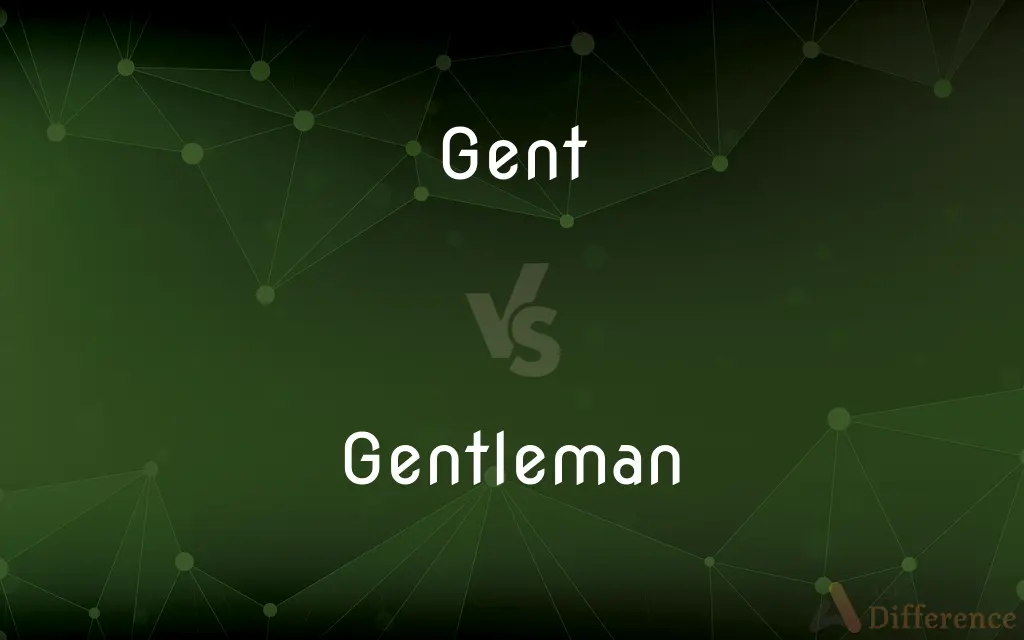Gent vs. Gentleman — What's the Difference?
By Tayyaba Rehman & Urooj Arif — Updated on April 1, 2024
"Gent" often refers to a man in a casual or informal context, while "gentleman" denotes a man with courteous conduct, reflecting qualities of maturity, dignity, and respect.

Difference Between Gent and Gentleman
Table of Contents
ADVERTISEMENT
Key Differences
"Gent" is a colloquial term that typically refers to a man in a general sense, without placing significant emphasis on his behavior or characteristics. It's often used in casual conversation or informal writing to denote a male individual. On the other hand, the term "gentleman" carries a connotation of respectability and courteous behavior, suggesting a man who behaves in a polite, considerate, and well-mannered way. While both terms identify male individuals, the context and implications of their use are distinct.
The term "gent" can be used with less specificity regarding the social or moral qualities of the individual it describes. It's a shorthand that might refer to a man in a particular place or situation without implying much about his personal qualities. In contrast, "gentleman" suggests a man who adheres to a high standard of conduct, often associated with traditional values such as respect, honesty, and kindness towards others. This distinction highlights the difference in the depth of character implied by each term.
Historically, "gentleman" referred to a man of noble birth or one who belonged to a specific social class, capable of living off his own means without engaging in manual labor or trade. Over time, the definition has evolved to focus more on behavior than on birthright or economic status. "Gent," however, has always been more informal and less tied to social class, often used simply as a casual reference to a male individual without implying social status or specific qualities.
In contemporary usage, "gent" is often seen in advertising and popular culture to suggest a modern, possibly stylish man, but without the depth of character or the emphasis on ethical behavior associated with the term "gentleman." On the other hand, being called a "gentleman" suggests recognition of a person's refined qualities and behavior, often evoking a sense of trustworthiness and reliability.
The differentiation between "gent" and "gentleman" also reflects in their use within certain expressions or contexts. For example, "a true gentleman" is a phrase that underscores the admirable qualities of a man, emphasizing traits like chivalry and courtesy. There is no equivalent high praise associated with "gent," which is more neutral and lacks the same depth of positive implication.
ADVERTISEMENT
Comparison Chart
Definition
A casual term for a man.
A man who is polite, well-dressed, and behaves well.
Connotation
Informal, neutral.
Respectable, with an emphasis on manners and conduct.
Historical Context
Lacks historical ties to social class or status.
Originally referred to men of noble birth or social standing.
Modern Usage
Used informally to refer to a man in general.
Denotes a man of good character and courteous behavior.
Implications
Does not imply qualities beyond gender.
Implies qualities of maturity, dignity, respect, and consideration for others.
Compare with Definitions
Gent
Used informally in conversation or text.
The gents at the table next to us were quite loud last night.
Gentleman
Refers to a man with courteous conduct.
He is a true gentleman, always polite and respectful to everyone.
Gent
Can imply a degree of stylishness without deep character assessment.
That gent really knows how to dress for the occasion.
Gentleman
Implies a man of good character and manners.
The gentleman offered his seat to the elderly lady on the bus.
Gent
Often used in advertising to appeal to a broad male audience.
This watch is designed for the modern gent who appreciates quality.
Gentleman
Associated with traditional values of respect and kindness.
Being a gentleman is about more than just wearing a suit; it’s about how you treat others.
Gent
Neutral in terms of manners or ethical qualities.
A kind gent offered to help me with the directions.
Gentleman
Can denote a man of noble birth in historical contexts.
In the 19th century, a gentleman was often someone of high social standing and wealth.
Gent
A casual reference to a man.
I saw a gent at the café who looked exactly like the actor we were talking about.
Gentleman
Used to highlight admirable qualities in a man.
Everyone appreciates how he conducts himself like a gentleman in every situation.
Gent
Graceful; elegant.
Gentleman
A gentleman (Old French: gentilz hom, gentle + man) is any man of good and courteous conduct. Originally, gentleman was the lowest rank of the landed gentry of England, ranking below an esquire and above a yeoman; by definition, the rank of gentleman comprised the younger sons of the younger sons of peers, and the younger sons of a baronet, a knight, and an esquire, in perpetual succession.
Gent
A gentleman.
Gentleman
A man of gentle or noble birth or superior social position
"He's too much a gentleman to be a scholar" (Aphra Behn).
Gent
(colloquial) A gentleman.
Gentleman
A well-mannered and considerate man with high standards of proper behavior. See Usage Note at lady.
Gent
(obsolete) Noble; well-bred, courteous; graceful.
Gentleman
A man of independent means who does not need to have a wage-paying job.
Gent
(obsolete) neat; pretty; elegant
Gentleman
A man
Do you know this gentleman?.
Gent
Gentle; noble; of gentle birth.
All of a knight [who] was fair and gent.
Gentleman
Gentlemen (-mən) Used as a form of address for a group of men.
Gent
Neat; pretty; fine; elegant.
Her body gent and small.
Gentleman
A manservant; a valet.
Gent
Informal abbreviation of `gentleman'
Gentleman
A man of gentle but not noble birth, particularly a man of means (originally ownership of property) who does not work for a living but has no official status in a peerage; an armiferous man ranking below a knight.
Being a gentleman, Robert was entitled to shove other commoners into the gongpit but he still had to jump out of the way of the knights to avoid the same fate himself.
Gent
A boy or man;
That chap is your host
There's a fellow at the door
He's a likable cuss
Gentleman
Any well-bred, well-mannered, or charming man.
Gent
Port city in northwestern Belgium and industrial center; famous for cloth industry
Gentleman
An effeminate or oversophisticated man.
Well, la-di-da, aren't you just a proper gentleman?
Gentleman
Any man.
Please escort this gentleman to the gentlemen's room.
Gentleman
An amateur or dabbler in any field, particularly those of independent means.
Gentleman
(cricket) An amateur player, particularly one whose wealth permits him to forego payment.
Gentleman
A man well born; one of good family; one above the condition of a yeoman.
Gentleman
One of gentle or refined manners; a well-bred man.
Gentleman
One who bears arms, but has no title.
Gentleman
The servant of a man of rank.
The count's gentleman, one Cesario.
Gentleman
A man, irrespective of condition; - used esp. in the plural (= citizens; people), in addressing men in popular assemblies, etc.
Gentleman
A man of refinement
Gentleman
A manservant who acts as a personal attendant to his employer;
Jeeves was Bertie Wooster's man
Common Curiosities
What distinguishes a gent from a gentleman?
A gent is a casual term for a man, often used informally, while a gentleman denotes a man known for his courteous behavior and good character.
Is the term gent derogatory?
No, the term gent is not derogatory; it's a neutral and informal term used to refer to a man.
Has the definition of a gentleman changed over time?
Yes, historically, the term gentleman referred to a man of noble birth or social standing, but it has evolved to emphasize behavior and character over social class.
Can the term gent refer to a young man?
Yes, the term gent can refer to a man of any age, including young men, and is not specific to any particular age group.
Does being a gentleman imply a certain way of dressing?
While traditional images of a gentleman often include well-dressed appearances, the core of being a gentleman lies in behavior and character rather than clothing.
Can any man be called a gentleman?
Yes, any man can be called a gentleman if he exhibits qualities such as politeness, respect, and considerate behavior towards others, regardless of his social or economic status.
How can someone be considered a gentleman in modern society?
In modern society, being considered a gentleman involves demonstrating qualities of kindness, respect, and consideration for others, regardless of the situation.
Are there any negative implications associated with being called a gent?
There are no inherent negative implications in being called a gent; it's a general and neutral term.
Is it outdated to use the term gentleman?
No, the term gentleman is not outdated; it remains a compliment and recognition of a man’s admirable qualities and behavior.
Do cultural differences affect the perception of what constitutes a gentleman?
Yes, cultural differences can influence the perception of what constitutes a gentleman, as norms around manners and behavior vary across cultures.
Share Your Discovery

Previous Comparison
Abusee vs. Abuse
Next Comparison
Opportunity vs. ProbabilityAuthor Spotlight
Written by
Tayyaba RehmanTayyaba Rehman is a distinguished writer, currently serving as a primary contributor to askdifference.com. As a researcher in semantics and etymology, Tayyaba's passion for the complexity of languages and their distinctions has found a perfect home on the platform. Tayyaba delves into the intricacies of language, distinguishing between commonly confused words and phrases, thereby providing clarity for readers worldwide.
Co-written by
Urooj ArifUrooj is a skilled content writer at Ask Difference, known for her exceptional ability to simplify complex topics into engaging and informative content. With a passion for research and a flair for clear, concise writing, she consistently delivers articles that resonate with our diverse audience.
















































